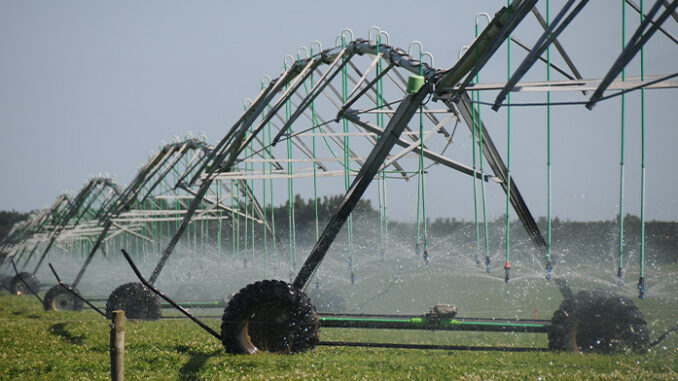
Arizona governor candidate Kari Lake has been quite emphatic that state water policy cannot regulate its way out of long-term droughts. She goes even further by saying that Arizona cannot continue to “give the agricultural community the short end of the stick when it comes to water supply.”
But her political opponents often retort that farmers “waste” huge amounts of water by growing water thirsty crops like cotton, sorghum and alfalfa in the arid desert and then just sells it as an export to Egypt. However, her opponents are ill informed because denying surplus water to Arizona farmers for exported crops will also result in a lack of surplus river water in dry years for, say, golf courses in Sun City, Arizona. Where the public is misinformed is that the same surplus water used for growing cotton and alfalfa is the same surplus water available in dry years for golf courses or apartment dwellers in urban Phoenix. So, denying farmers their allocation of water for export crops would only end up shooting the cities in their own foot, so to speak. How so, you ask?
Allow me to explain. I previously worked for the largest urban, wholesale water district in Southern California and have also valued private water companies regulated by the California Public Utilities Commission. I have been a water policy analyst for the conservative Pacific Research Institute, California Globe and the free-market water and energy website Master Resource. I worked on a land fallowing project in the Palo Verde Irrigation District along the Colorado River in California where farmers fallowed their crops and, in turn, that water was bought by the Metropolitan Water District of Southern California for conveyance to cities during dry spells.
The typical way the water system works in both Arizona and California is that farmers rely on Colorado River Water during wetter years. But during drier years farmers shift to groundwater, thus freeing-up Colorado River water for use by cities. Another way to put this is that cities rely on farmers for water during dry spells. Farmers are the interim stewards of raw water for cities during wet years. 40 percent of Arizona’s water comes from groundwater. Groundwater is typically left untapped during wet years and pumped out of the ground during dry years.
So, Arizona water policy is not what the public has been led to believe by politicians and media. It is not what is called a “zero sum” game where the result is one side gains everything and the other side gets zero. As explained above, that is not how the water system works. Urban and agricultural water users depend on the same allocation of river water by alternating its use depending on whether it is a dry year or a wet year. If Arizona wants farmers to get less of an allocation of river water to grow cotton or alfalfa that will result in an equivalent loss of allocated water for Arizona cities. Put differently, if Arizona wants to cut farmers allocation of surplus river water and divert it to cities, that water may just end up being pumped to Los Angeles instead. Hence the phrase, “use it, or lose it.”
This is why California water experts have an inside joke that water conservation by limiting the size of bathroom toilet tanks was a mirage because the toilets often needed to be flushed twice!!!! Such policies give the appearance of water conservation, while effectively using more water. This is often called a “perverse incentive” because it ends up contrary to the stated intention of its social engineers. The latent water policy is to take as much river water as one can get away with or they will lose some of their water allocation. All public utilities have this problem where their regulated water or power rates result in an incentive to enlarge the base by padding. Regulated water allocations of river water are no different.
So, listen up Arizonans. Kari Lake, love her or hate her, is a media-savvy person and apparently knows how the water policy game is played. The media just want to sell newspapers or internet hits. The politicians tend to want to divide us into believing that the division of labor between farmers and urbanites is the problem. This just moves the problem around instead of solving it. Taking river water from farmers is a lose-lose game for all Arizonans. Water retailers often disguise water rate hikes by water conservation programs. Don’t blame Kari Lake, a current-day Cassandra, for telling the truth. Her opponents make her out to be former broadcaster boob who knows nothing about water, energy or conservation. In the long term, Kari Lake wants to consider filling Arizona lakes along the Colorado River with imported water from the Missouri River, wherever feasible, using the $4 billion allocated under the Inflation Reduction Act for water infrastructure.
Don’t drink from the poisoned water well of politics. Vote wisely for governor.
Wayne Lusvardi lives in Sun City, AZ. Contact waynelus@yahoo.com
